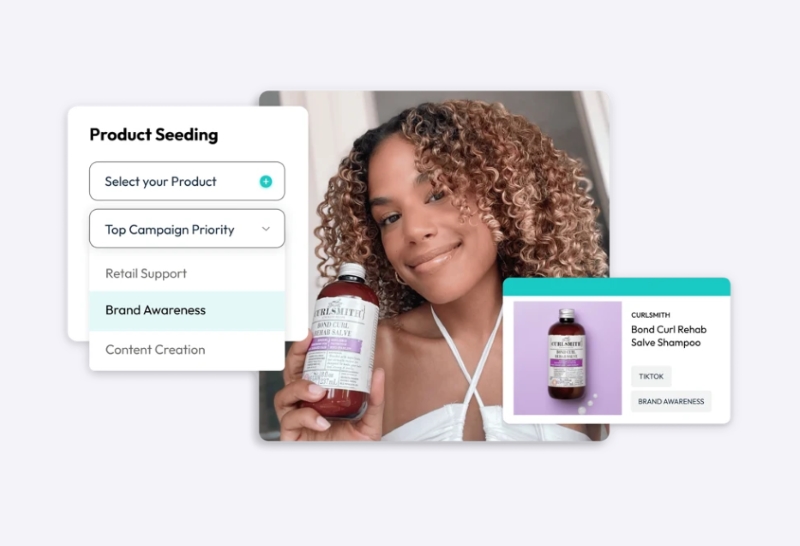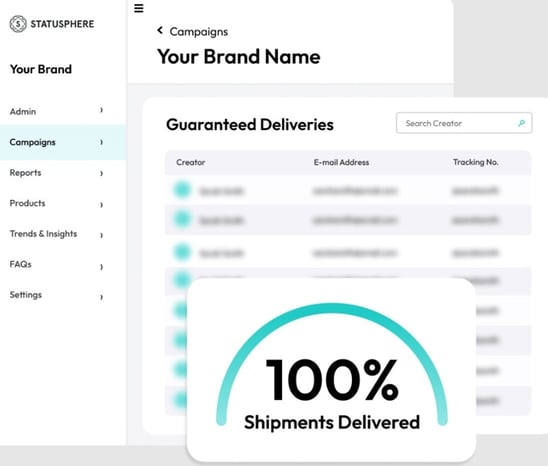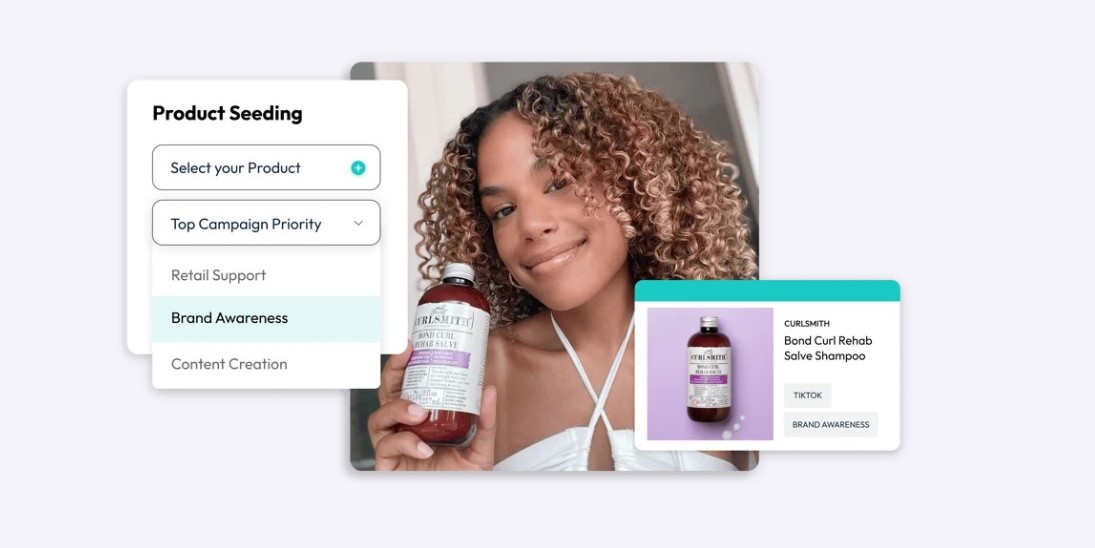
Is a product seeding platform on your radar?
If so, you're in good company. Literally.
Because we're seeing more brands ramp up their product seeding campaigns. Especially companies that already collaborate with micro-influencers at scale.
Makes sense! Recent data confirms that social media and influencers reign as the top channels for product discovery. Still, brands are fighting fickle algorithms and ever-changing paid ads.
But with 100s of creators hyping your products, you can 10x your visibility with fewer roadblocks.
More user-generated content. More positive reviews. Higher social SEO rankings.
Product seeding can make all of the above happen (and then some) faster.
But actually shipping products to 100s of creators is a time-sink (and logistical nightmare!) without a seriously streamlined process. That's where an influencer product seeding platform can save the day.
What Can an Influencer Product Seeding Platform Do?
It depends! Features and use cases vary from platform to platform.
That said, any given product seeding platform should have features to accomplish these goals:
- Save your team as much time (and stress!) as possible. Having shipped tens of thousands of products to creators, we know firsthand how exhausting fulfillment can be. The right platform should take that process off your plate, along with creator outreach and management.
- Increase the posting success rate of your campaigns. Many brands fall into a “spray and pray” influencer seeding strategy where they ship products and hope for the best. Your platform should not only help you get products into creators’ hands but also encourage a high volume of quality content.
- Support your brand’s existing influencer marketing strategy. If you’re already running influencer campaigns, it makes perfect sense to send products to creators who already know and trust your brand. Product seeding and influencer marketing campaigns shouldn’t be siloed as they go hand in hand.
- Remove the “randomness” from your seeding campaigns. A platform can achieve this by guaranteeing deliveries to vetted creators and reporting on your results. This means you can take a data-driven approach to seeding like you would any other type of marketing campaign.
- Align with your brand’s big-picture business goals. Seeding is popular among brands that frequently launch products or run in-store retail campaigns (or both). Done right, a platform can scale your seeding to 100s of creators. This builds word of mouth when you need it most.
We can’t speak for every product seeding platform out there in terms of features. Still, many influencer platforms leave brands on the hook to handle outreach, communication and fulfillment.
And that’s where Statusphere's product seeding platform is different.
We offer brands the flexibility to do influencer marketing and product seeding campaigns side-by-side seamlessly. Our software guarantees delivery for product seeding while also automating tasks like shipping, reporting and gathering influencer content.
This allows you to plan and oversee your campaigns without you and your team sinking 100s of hours into tracking shipments or updating spreadsheets.

4 Signs That Your Brand Needs an Influencer Seeding Platform
Making any sort of change to your martech stack can be daunting.
But the popularity (and effectiveness) of seeding campaigns speaks for itself.
We’ll say it again: word of mouth is crucial for the sake of building awareness for brands. This is particularly true with beauty and CPG brands where competition is so fierce.
When seeding campaigns are done right, they can grow your organic reach, boost your paid ads and scale social proof for your product launches.
Below are the telltale signs that you’re overdue for a seeding platform upgrade.
1. Influencer Fulfillment is Taking Over Your Team’s Schedule
Sure, modern marketers are expected to wear multiple hats.
But “inventory manager” or “shipping specialist” shouldn’t be either of them.
Trust us: shipping products to influencers can be a full-time job by itself.
The more creators you seed, the more time you sink into fulfillment. 100s of influencers can easily snowball into endless hours from your schedule.
That’s why our influencer fulfillment technology is a game-changer for brands serious about product seeding at scale. From shipping to communication, our software streamlines the process from A to Z.
Our matchmaking algorithm likewise ensures that the right products reach relevant creators. Also, this approach to influencer fulfillment puts creators first. That’s because our platform…
- Gets your products into the hands of creators who authentically want to post about you (either through our network or creators you upload to our platform)
- Processes shipments within 48 hours and guarantees delivery in a personalized StatusBox
- Provides up-to-date tracking to creators who claim your products and receive your brand's influencer seeding kits
.png?width=510&height=512&name=personalized-fulfillment%20(1).png)
Here's the thing: many product seeding platforms don’t put enough emphasis on creators.
Consider how a creator-first approach results in better content from seeding. Not to mention more content! We’ve spent years cultivating relationships with our community of influencers. For creators, product seeding with Statusphere feels like getting a gift from a friend versus a random box.
2. You’re Spending Hours Updating a Seeding Spreadsheet
For marketers, spreadsheets are a love-hate relationship.
Having built our own influencer management spreadsheet, we know how frustrating it can be to keep information up to date once you’re communicating with more than a handful of creators.
For brands that want to do product seeding campaigns at scale, managing the process with spreadsheets is super inefficient. Beyond being a massive investment of time, consider how quickly your spreadsheet gets outdated.
Social handles change. Creators move. Life happens.
However, that also results in lost and missing shipments which are a waste of time and product.
Again, our influencer seeding platform ensures guaranteed delivery. Statusphere only sends products to our vetted network and/or your own list of influencers uploaded to our platform via CSV.
Creators’ information is kept in one place and confirmed prior to shipping. No spreadsheets in sight!

Automated matchmaking means that you don’t have to conduct any research or outreach, either. Features built into our platform such as instant creator reactivation mean that you can continuously seed influencers that knock it out of the park.
3. Your Product Seeding Performance Feels Like a Mystery
“Show me the data” is the mantra of modern marketers today and rightfully so.
But seeding campaigns are notoriously tricky to measure.
Despite popular belief, influencer seeding doesn’t have to be random in terms of outcomes. Our brands do product seeding with a variety of goals in mind, including:
- Promoting and building awareness for product launches
- Getting more content for UGC ads
- Social SEO and ranking for social media keywords
- Retail support
- Ongoing brand awareness
Or a combination of all of the above!
With Statusphere’s influencer reporting, you get real-time data to understand how seeding ties to the goals above. Our software tracks the following (and more!):
- # of products delivered
- # of posts received from product seeding
- Engagement metrics on Instagram and TikTok
- Reach
- Time saved
With a pulse on all of the above, you can treat product seeding more like a proper performance marketing channel versus something you have to constantly second-guess.
4. You’re Running Out of Creators to Send Products To
Like it or not, you can’t just send products to the same handful of creators over and over.
Especially if you’re launching a variety of products or want to reach new audiences.
This is where Statusphere yet again can help.
Our platform is built to help brands partner with their favorite creators and uncover new influencers who’d be perfect fits to promote your products. Our network is both vetted and always growing which is good news for our brands!
The best part? We don’t make our brands sift through social products or do any manual outreach.
Instead, you automatically match your brand with (and only with!) relevant influencers based on 250+ unique, first-party data points. In-depth matchmaking means your product only gets into the hands of people who authentically want to use it.
This delights creators, improves your posting rate for seeding and results in better content.
Our software is also built to support brands running simultaneous, ongoing campaigns with a variety of products. For example, a beauty brand promoting a curly hair shampoo and a face serum can reach totally different creators on our platform without lifting a finger.
If you're still curious about how our software to other product seeding platforms, make sure to check out our post breaking down the features of Statusphere versus Insense!
How to Scale Your Product Seeding With the Right Influencer Marketing Platform
We know firsthand how demanding DIY product seeding can be.
The reality? So much of marketing today is a numbers game. Seeding is no exception.
Brands need to scale product seeding for the sake of more word of mouth but doing so can feel risky in terms of time and resources.
Still, seeding influencers is an expectation for brands today regardless of your success rate. If you’re on the fence about using a product seeding platform, ask yourself:
- Is your team’s scheduling being eaten up with spreadsheets, fulfillments and outreach?
- Does your team lack the bandwidth to ship products 100s of creators (versus a handful)?
- Is getting products into the hands of creators your top priority (versus guaranteed content)?
- Do you want a streamlined approach to product seeding without bouncing between platforms?
If any (or all!) of the above apply to your brand, Statusphere’s software can help.
We’ve built the best product seeding platform for brands that want to confidently ship products to hyper-targeted audiences with guaranteed delivery.
And if you choose to integrate your influencer marketing campaigns into our platform, you can save even more time (not to mention reach more creators).
-1-1.png?width=700&height=429&name=Get-More-Content-4%20(1)-1-1.png)
We’ve shipped products to tens of thousands of creators on behalf of 400+ brands. Our micro-influencer platform manages everything from matchmaking and influencer management to fulfillment and beyond.
And best of all, you’ll never have to look at another spreadsheet for product seeding ever again!
Want to learn more about how our platform works? Get in touch with one of our experts to learn how our software can help you scale product seeding in a fraction of the time.
This article was first published in May 2019. It was last updated July 19, 2024.
